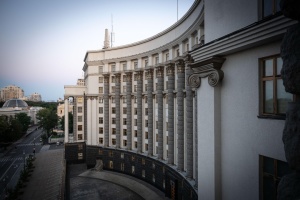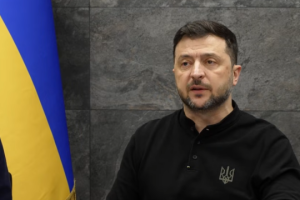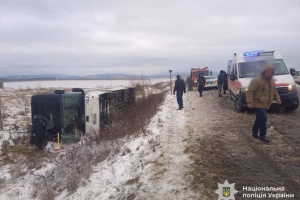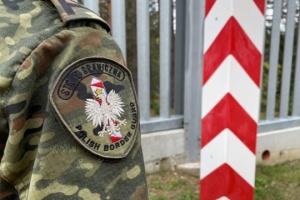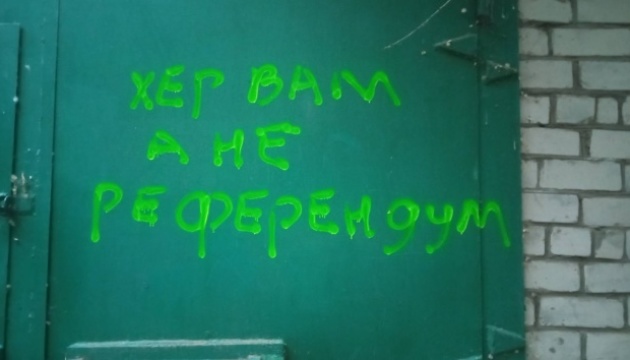
“Vote and lose.” Russia laying grounds for sham referenda in occupied areas
However, the Kremlin does not abandon attempts to at least apparently “legitimize” its actions. This is evidenced by the constant spread of new information on the topic of “referenda” in the occupied territories.
However, Russian real decision-makers or those who are at least allowed to voice the official position of the Kremlin remain silent. Thus the Kremlin is distancing itself from the topic.
On August 8, Putin’s spokesman Dmitry Peskov assured that “referenda are to be conducted not by Russia but by the local population.” Admins of anonymous Telegram channels and groups on social networks, local collaborators, and representatives of occupation administrations, Russian propagandists, and political commentators were left to comment on the situation.
At best, MPs of the State Duma are sometimes “suddenly” asked by journalists with the government-run or partially state-owned media, are asked about “referenda.”
Through these communication channels, inconsistent messages on the format, dates, and geography of “referenda” are periodically spread in the media space. From time to time, statements about their futility appear, as well as proposals to simply declare the occupied territories part of Russia. Sometimes the same speaker makes opposite statements.
Kherson-based collaborator Kirill Stremousov stated on May 11 that “Kherson is Russia” and that “there will be no referenda.”
And in two weeks he announced the voting and even “predicted” its outcome: “In Kherson region, a referendum will be held, where at least 60-70% of residents will vote for accession to Russia.”
On September 5, he assured the audience that “everything goes to plan” and that “the referendum will take place in any weather.”
Not the first pseudo-referendum
The Kremlin has already worked out the technique for running pseudo-referenda at gunpoint in the Autonomous Republic of Crimea, Sevastopol, as well as Donetsk and Luhansk regions in 2014. However, the Russians didn't invent the wheel here
In 1938, the world watched the Anschluss organized by Hitler’s Germany. The Nazis declared that the results of the “plebiscite” testified to the support for Austria’s “reunification” with the Third Reich at 99%.
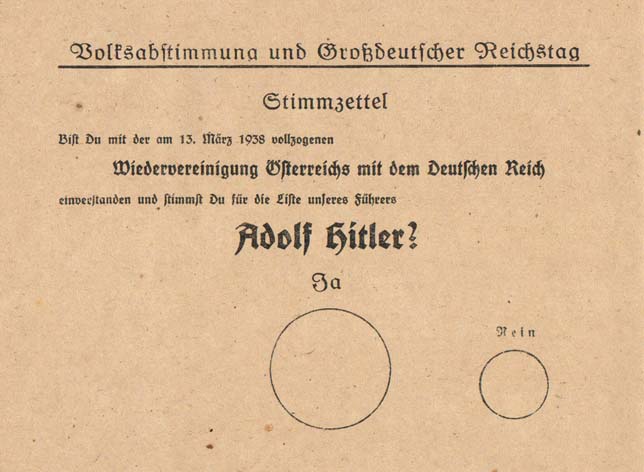
In local conflicts that broke out in the post-Soviet space in the 1990s, not without the participation of Russian special services, plebiscites were used to weaken new independent states and strengthen their dependence on the Kremlin.
Such “expressions of free will” took place in Crimea (1991), Transnistria (1991), South Ossetia (1992), and the Narva region of Estonia (1993).
In addition to autonomy and independence, pro-Russian referenda sometimes raised the issue of “reunification” with Russia, but back in the nineties, Moscow did not dare pursue a full-blown annexation.
The Crimean “referendum” of 2014 became a precedent in the recent history of the Russian Federation. For the first time after the collapse of the USSR, the Kremlin performed illegal annexation under the guise of the “manifestation of will” of the local population.
The declared outcome — 96% “in favor” — fell short of the figures drawn by the Nazis in Austria in 1938.
Notably, during the preparation for the referendum, inhabitants of Crimea were initially prepared for voting for “secession from Ukraine” and “independence,” which was considered a transition period before “reuniting with their Motherland.”
The new formulation of the question in the ballots was published only on March 6 — just 10 days before the “voting.”
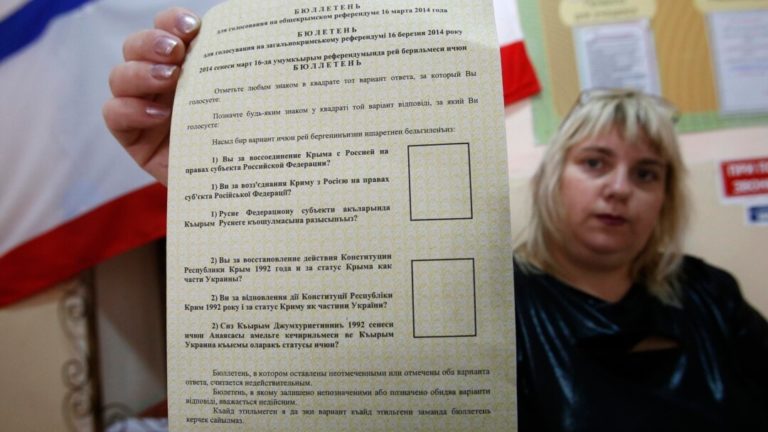
Propagandists assured the residents of Donbas that the proclamation of “independence” of “LPR” and “DPR” would automatically lead to the cessation of hostilities and the restoration of peace in Donbas.
In Donetsk region, the organizers of the “referendum” “reported” 89%, and in Luhansk region — 96% of support for “young republics.” The Kremlin did not go for the annexation of the occupied areas of Donbas, despite hopes of the pro-Russian part of the local population.
The region became a tool for destabilization of Ukraine, and its inhabitants — a resource for propaganda and military adventures of the Putin regime.
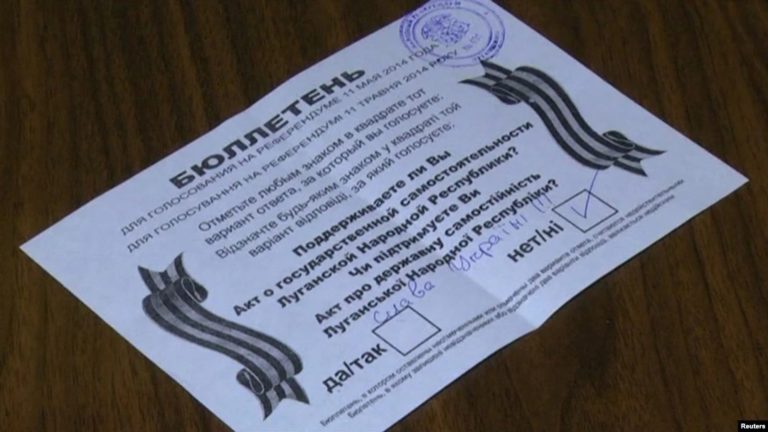
“Referendum” scenarios
Several referendum options are being spread in the media space:
● on the accession of the pseudo-republics “DPR” and “LPR” to Russia;
● on the sessation of the occupied territories from Ukraine and the creation of new “people’s republics.” These messages were most actively promoted this spring in Kherson region;
● on the accession of the occupied territories to Russia. In the northern part of Kharkiv region, residents heard hints at the possibility of certain districts and settlements becoming part of the neighboring Belgorod region of the Russian Federation.
Leonid Pasechnik, leader of the “LPR,” spoke about the referendum on March 27 . However, on the same day, he refuted his own statement, saying that first, it was necessary for the Russian forces to advance to the administrative borders of Luhansk and Donetsk region before the question could be raised.
The dates of the potential “referenda” were repeatedly postponed. In particular, it was April 27, first half of May, September 11 (the Single Voting Day in Russia and the 21st anniversary of the attack on twin towers in New York), late October, and November 4 (Russia's Unity Day).
Preparations
On July 23, heads of occupation administrations of Zaporizhia and Kherson regions announced that they were preparing for the “manifestation of will” and forming election commissions. On August 8, Yevhen Balytskyi in Melitopol publicly signed the relevant “decree.”
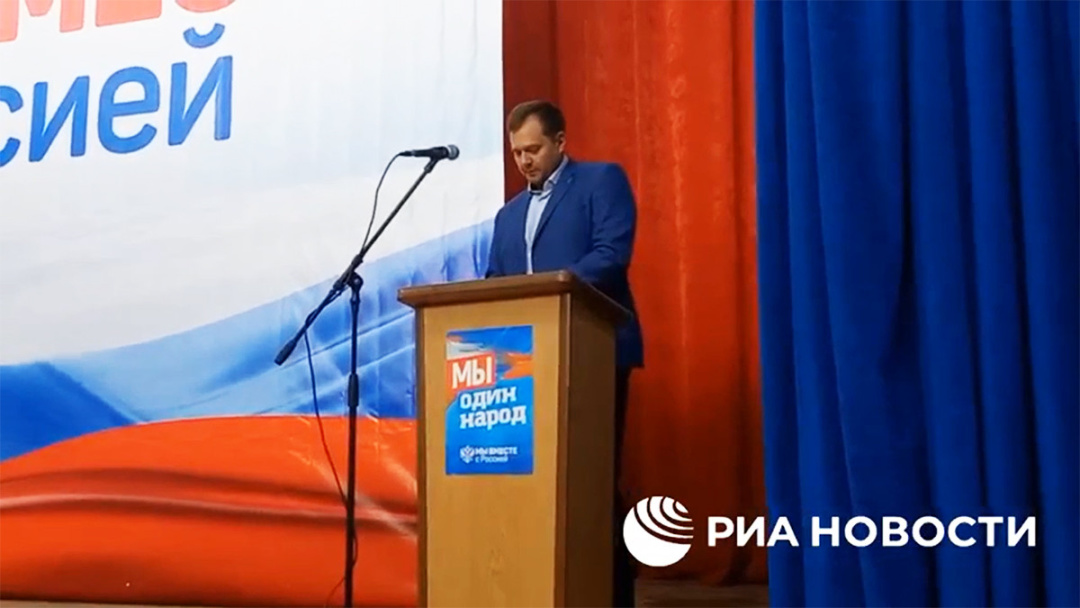
Kirill Stremousov limited himself to oral statements. Collaborators also announced their intention to apply for help from the Russian Central Election Commission.
At the same time, the head of the occupational “military and civilian administration” of Kharkiv region, Vitalii Hanchev, repeatedly made statements about the “untimely nature” of the “referendum,” with Russians controlling only a fifth of the region's territory.
Russian propaganda is working to create an illusion of mass support for the ideas of the accession of the occupied territories to Russia, and is also actively engaging with the local population. To solve the first problem, public meetings and rallies have been organized.
Newly created “public councils” under the occupation administrations, “associations of veterans,” “councils of women,” and other similar groups of random people approved appeals in support of the referendum.
Ukrainian intelligence reported that the participants in the rallies would receive money and food kits from the occupiers. There were also cases where activists of “Rosmolodezh,” “Young Guard,” and other organizations brought from Russia posed as locals.
To influence the population of the occupied territories, the following tools are employed:
● Visual propaganda. In settlements, advertising space is occupied by billboards with Putin’s quotes and slogans “Russia is here forever” and “We are one people”;
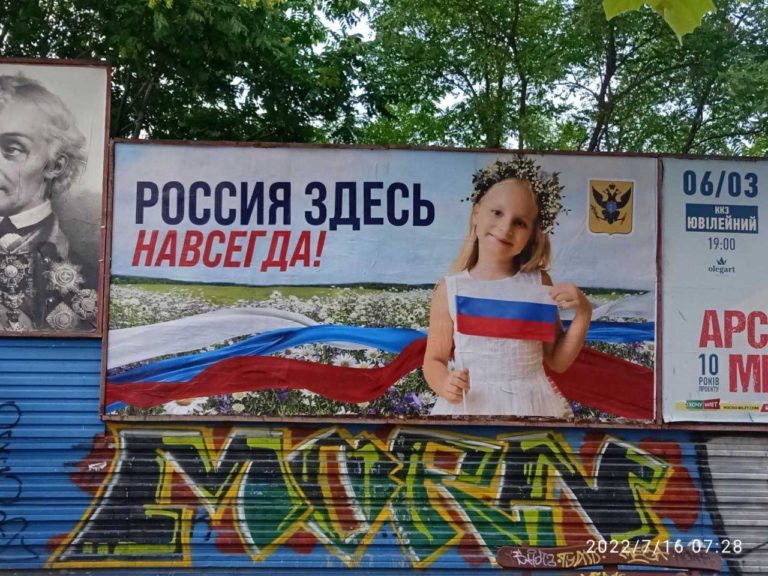
● Leaflets, free campaign newspapers, and other printed products;
● Russian television and radio broadcasting stories about a “happy life” under occupation and mass support on the part of the locals;
● Telegram channels and communities in social networks created for information support of the occupation;
● Face-to-face campaigning involving local collaborators and United Russia activists. They process people during the registration and issuance of cash payments, food kits, and Russian passports. Guides for communication with the population are also available for the servicemen of the occupying state;
● Information blockade of the occupied territories: suppression of Ukrainian television and radio signal, blocking of Ukrainian websites, etc.
People are being persuaded that:
● Ukraine will not be able to retake captured territories (“Russia is here forever”);
● Ukraine considers the inhabitants of the occupied territories traitors and intends to prosecute them;
● Russia guarantees security, stability, pensions, jobs, reconstruction of what has been destroyed, etc.;
● Ukraine, the US, and NATO, not Russia, are responsible for the war, deaths, and destruction.
The preparation and conduct of “referenda” are hindered not only by intense hostilities, but also by the lack of access of the occupiers to the Ukrainian voters' register.
To fix the problem, Russians are collecting personal data of locals under the pretext of registration for payments, humanitarian assistance, medicines, issuance of temporary pension certificates of the Russian sample, etc. Forcible passportization of the population is in progress.
Police units formed in the occupied territories consisting of Russians and local collaborators can also be considered an element of preparations for pseudo-referenda. After all, these “law enforcement officers” will be instructed with maintaining “public order” during the “manifestation of will,” including at polling stations.
Forced severance of economic relations, prompting the population to switch to roubles, and removing hryvnias from circulation, as well as making the areas part the Russian information space are all expected to create an illusion among the population of the occupied territories that “Ukraine has abandoned them,” and to encourage people to accept “Russian rules.”
British intelligence reported that in mid-August, preparations for pseudo-referenda in Donbas were at one of their final stages.
At the end of the month, The Insider published documents elaborating a scenario of plebiscites and their PR support. Kremlin political technologists are focused on ensuring a 70% turnout and support for the issue put to the vote at the same level.
Russian sociologists seem to be guided by these indicators as well. On September 7, the Republican Institute of Political and Sociological Studies (RIPSI) (Simferopol) and the “INSOMAR” company announced the conducting of surveys in the occupied cities of Zaporizhzhia and Kherson oblasts.
The “results” were reported by Russian Telegram channels and propaganda media, and were referred to by the Secretary of the General Council of “United Russia” Andrey Turchak.
The publication of the paid-for sociology is a well-known technique for legitimizing the results desired by the customer.
Deputy Director of the Center for Middle Eastern Studies Serhii Danilov cites insufficient number of collaborators and extremely low level of public support for the occupiers among the problems that the organizers of pseudo-referendums in the South of Ukraine encountered. Therefore, the Russians promise to visit those who will ignore the voting.
“There are not enough people, there is zero support. The situation is being moderated by the Armed Forces of Ukraine and local guerrillas. Intimidation is the recognition of hostility towards the occupation. The operation of the Armed Forces of Ukraine on the right bank of the Dnipro in general questions all this,” the expert stated.
According to Danilov, the occupation administration sent residents of Henichesk and Novotroitsk districts, who are to work in election commissions later, to Simferopol for training.
Despite the permanent stirring up of the topic of “referendums,” propaganda is working on option B. Messages about the unjustified or untimely nature of the plebiscite are spread in the information space from time to time. The following arguments are cited:
● “Referendum” cannot be held under shelling;
● voting in Zaporizhzhia and Kharkiv oblasts is inexpedient without establishing control over most of the oblasts and oblast centres;
● referendums are possible only after the completion of the “special operation” and “full stabilization” (without specifying what exactly is meant);
● accession can take place without “referendums” because “liberated” regions are “already Russia.”
Consequently, the occupation administrations and supporters of the “Russian world” always have an excuse why the promised “referendums” are not held. Especially since Russian officials did not make any specific statements on this topic and did not make any promises.
Why Would Russia Need That?
No “voting” in the occupied territories will have legal consequences and be recognized by the international community. Exceptions may be made only by a few rogue states from among the “friends” of the RF. However, with the help of pseudo-referendums or preparations for them, the Kremlin tries to solve several problems.
● present the internal audience with Putin’s formalized “victory” as a “collector of Russian lands” and proof that the RF did not occupy, but “liberated” the captured regions;
● provide Russian diplomats with a few arguments regarding the «total support» for the occupation by the local population. The worthlessness of these arguments is not considered;
● strengthen the position of propaganda targeting foreign audiences, shifting the focus from armed aggression and occupation to supposedly “democratic procedures” and fake “manifestation of will.” The Kremlin obviously counts on the fact that this will have an impact on the inhabitants of countries in Asia, Africa, and Latin America;
● in the case of annexation of Ukraine, the fight to restore territorial integrity could be called “an aggression against Russia” and use this argument to mobilize its own population, disorient foreigners, and justify threats of use of nuclear weapons.
Russia’s tactics comes down to a regular “raising of stakes,” which should force the world to “reckon with Russia,” to accept the forceful change of borders in Europe, and other brutal violations of international law. However, the position of the military and political leadership of Ukraine and partner states remains unchanged.
Representatives of the Ukrainian government recommend that the citizens of the occupied territories avoid “voting” if possible, and remind that criminal liability has been provided for participation in the organization of such events (campaigning, acting as commission members and observers).
President Volodymyr Zelensky back in August said that “if Russian occupation forces decide to hold at least one pseudo-referendum in the occupied territories of Ukraine, there will be no possibility for negotiations with Russia.”
The readiness of the Armed Forces of Ukraine to restore territorial integrity by military means and understanding of challenges was confirmed by the Commander-in-Chief of the Armed Forces of Ukraine, Valeriy Zaluzhnyi, in an article published on September 7.
Center for Strategic Communications and Information Security

